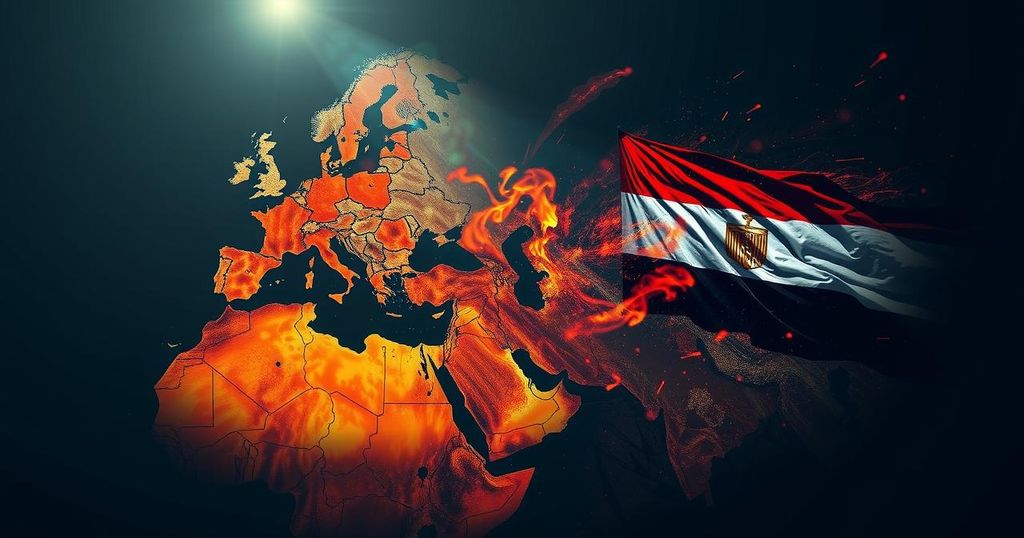Egypt’s involvement in the Israel-Lebanon conflict is marked by Minister Badr Abdelatty’s proactive diplomatic efforts to halt Israeli aggression. Egypt leverages its historical role in regional mediation, engages international and Arab partners, and aims to stabilize Lebanon amidst rising tensions following recent military actions. Despite challenges, Egypt’s neutral position provides a unique opportunity for constructive mediation and humanitarian support to the Lebanese populace.
Egypt’s engagement in the ongoing Israel-Lebanon conflict has been significantly underscored by the statement from Egyptian Foreign Minister Badr Abdelatty, who highlighted his ongoing communications with international and regional entities aimed at halting Israel’s aggression in Lebanon. This endeavor aligns with Egypt’s historical involvement in Middle Eastern conflicts and showcases its diplomatic intentions to mitigate further escalations following the intense conflict that erupted post-October 7, leading to widespread military actions by Israel. During his visit to Beirut, Minister Abdelatty stressed Egypt’s objective is to promptly stop Israel’s aggression, underlining the importance of consistent dialogue with key international players, including the United States, France, the European Union, and Arab nations. His discussions with various Lebanese factions underscore Egypt’s active approach in seeking a resolution, although it raises questions regarding the capacity of Egypt and the wider Arab bloc to withstand potential Western pressures during diplomatic engagements. Historically, Egypt has played a formidable role in mediating regional conflicts, notably evidenced by its pivotal participation in the Camp David Accords in 1978. Moreover, Egypt’s involvement in Lebanese matters, ranging from the Arab Cold War era to the civil war, has established its identity as a stabilizing force in the region. Given the recent increase in tensions due to Israel’s operations against Hezbollah, Egypt’s importance as a mediating power has again come to prominence as it navigates complex geopolitical landscapes influenced by longstanding rivalries and various national interests. Egypt’s direct ties with both Israel and Arab states enable it to act as a mediator during conflicts, pulling from its previous experiences in managing significant asymmetrical conflicts, such as those involving Palestinian factions during Israel’s previous incursions into Gaza. With heightened risk of a regional escalation resulting from the current conflict, Egypt is strategically positioned to foster dialogue, either through discreet negotiations or established multilateral platforms like the Arab League and the United Nations. Furthermore, Egypt aims to prevent the conflict from destabilizing neighboring countries like Syria and Jordan, indicating the broader regional ramifications of the crisis. Efforts include engaging with different Lebanese factions and potentially communicating indirectly with Hezbollah via third-party nations such as France or Qatar, demonstrating the importance of diplomacy in ensuring restraint amongst belligerent parties. Additionally, Egypt’s commitment also extends to stabilizing civilian life in Lebanon by facilitating humanitarian support, aiding in reconstruction, and politically bolstering Lebanese institutions to avert state collapse. This multifaceted approach underscores Egypt’s dedication to fostering stability in its neighboring regions, remaining cognizant of the roles that other stakeholders—including Iran and Gulf states—play in shaping the Lebanese landscape. Although Egypt cannot singlehandedly resolve the ongoing Israel-Hezbollah conflict, its active involvement within a collaborative framework can contribute to de-escalation efforts. To maximize its influence, Egypt must continue pressing for immediate ceasefires through platforms like the Arab League and the UN while bolstering relationships with key Arab partners. The ultimate success of these diplomatic endeavors relies heavily on carefully balancing complex regional interests and fostering coordination with international entities.
This article analyses Egypt’s strategic role in mediating the conflict between Israel and Lebanon, particularly through its diplomatic efforts following significant military escalations exacerbated by the October 7, 2023 events. It traces Egypt’s historical role in Middle Eastern conflicts, including its long-standing relationships with other regional players and its involvement in previous peace efforts. Furthermore, it examines the challenges faced by Egypt in negotiating peace amidst conflicting interests and Western influences.
In summary, Egypt’s potential role in de-escalating the ongoing Israel-Hezbollah conflict is underscored by its historical mediation experience, regional alliances, and diplomatic outreach. Despite facing challenges from Western influence and the complexity of the Lebanese situation, Egypt remains a crucial player in fostering dialogue and stability in the region. Its efforts to engage various stakeholders and promote humanitarian support are essential in navigating the intricacies of current conflicts in Lebanon.
Original Source: www.arabnews.com






